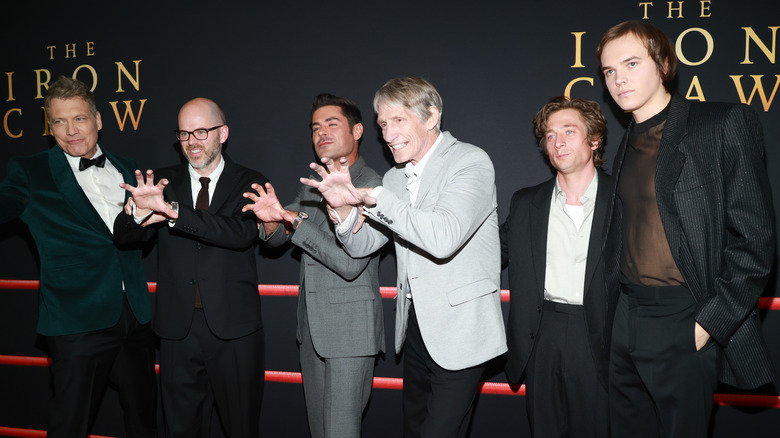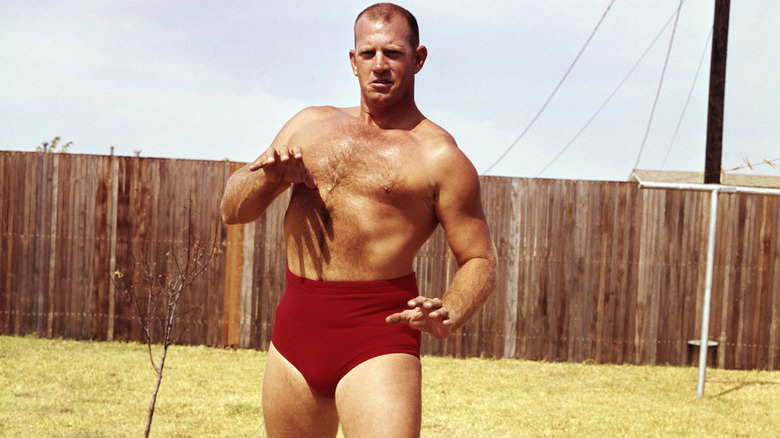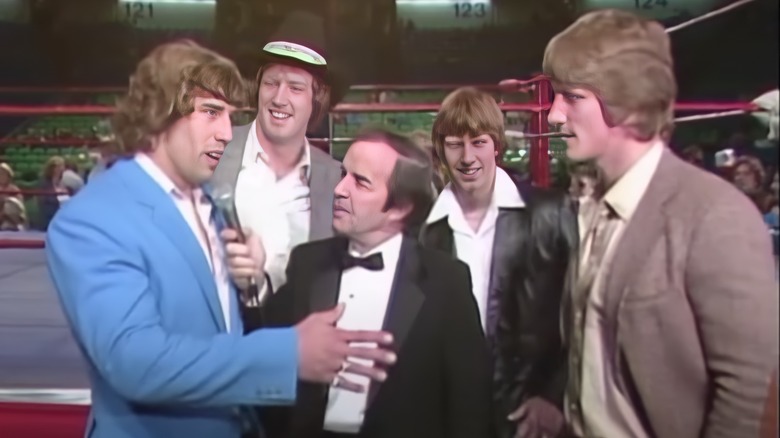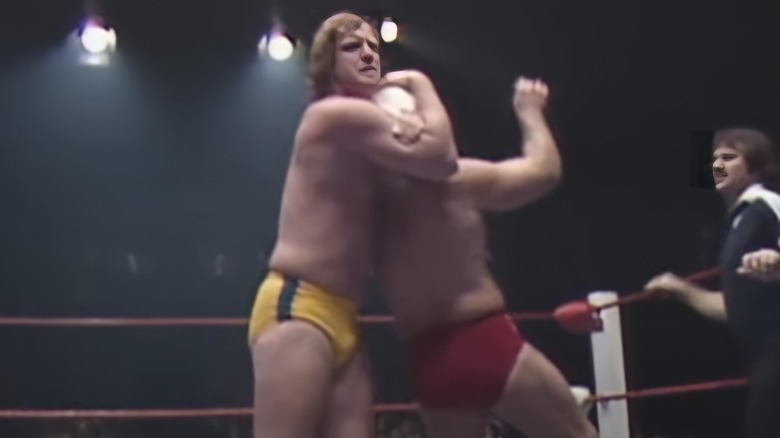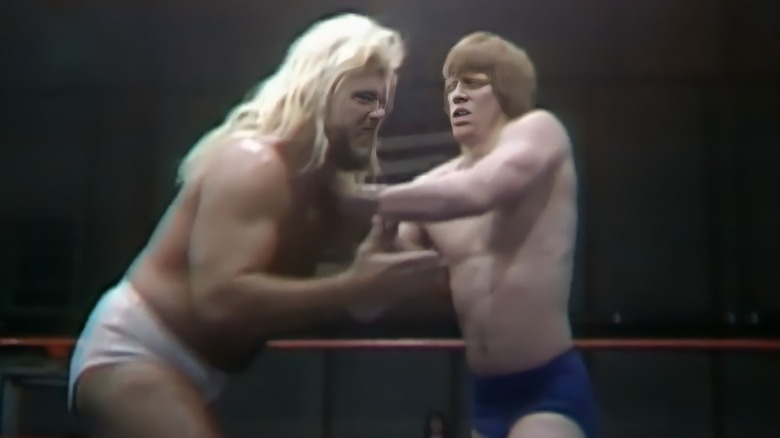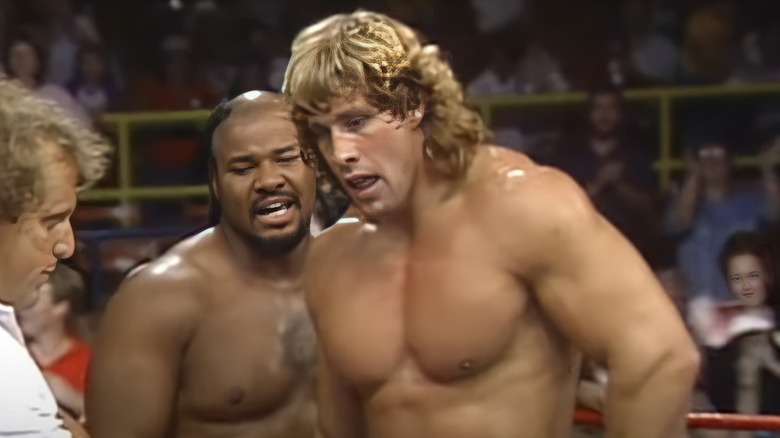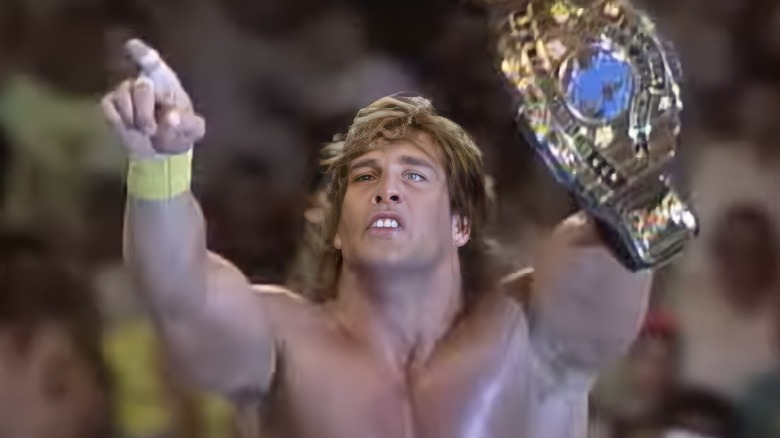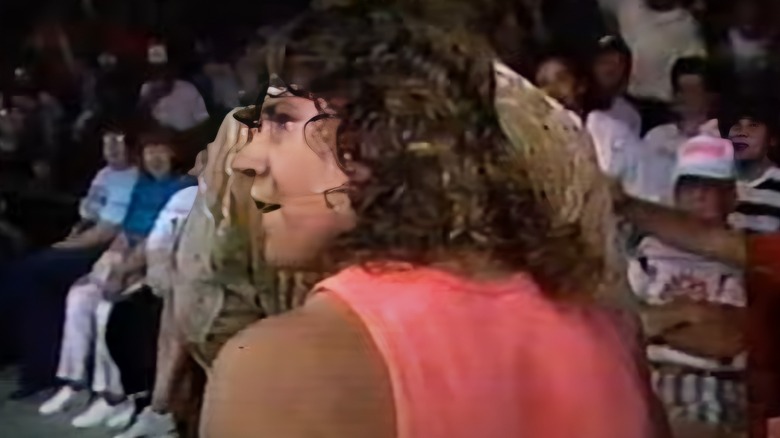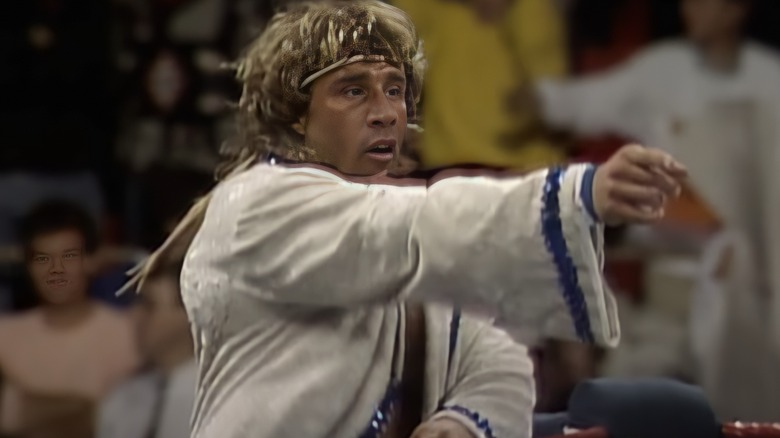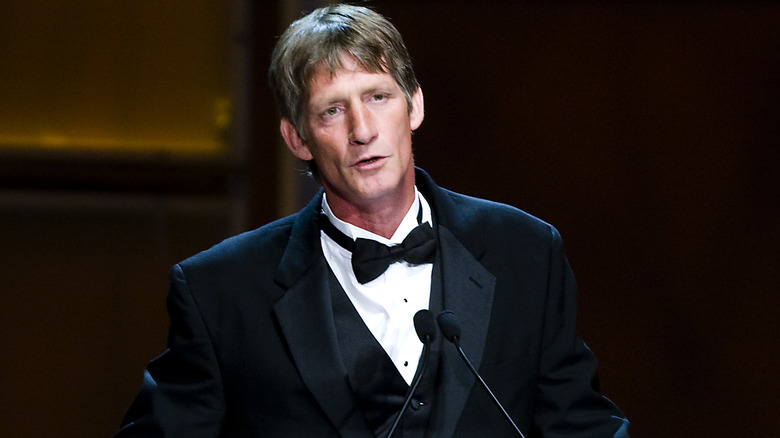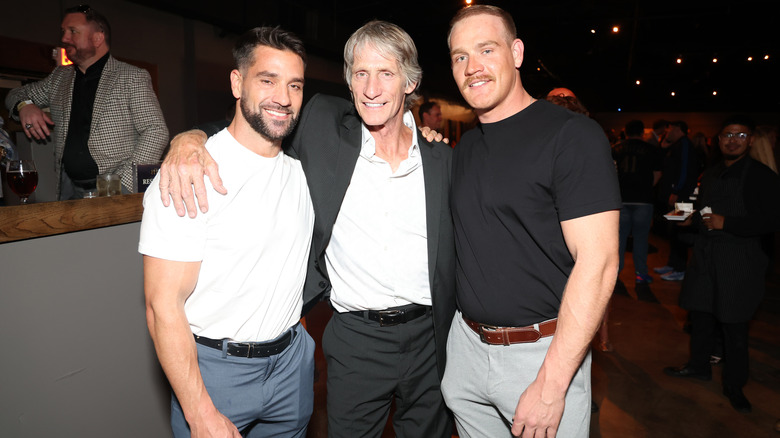The True Story Of The Von Erich Family Portrayed In The Iron Claw
Way back in 1997, Kevin Von Erich reflected on the myriad trials and tribulations his family faced in its many decades in the wrestling business. "You put wrestling as the backdrop, but the human story is unbelievable," he told the Dallas Observer. "It's funny, and it's sad, and it's an emotional roller coaster. I would think it's what a movie producer would be looking for. Why the heck aren't they knocking on my door?"
Twenty-six years later, the Von Erichs are finally the subject of a big-screen project. "The Iron Claw" focuses on the lives of brothers Kevin (Zac Efron), David (Harris Dickinson), Kerry (Jeremy Allen White), and Mike (Stanley Simons) and their father, Fritz (Holt McCallany), and the challenges they face together as a pro wrestling dynasty. While Fritz's sons experience collective success as pro wrestlers, mainly in their home state of Texas, the onetime football star ultimately outlives all but one of his boys as the family deals with tragedy after tragedy.
Although "The Iron Claw" paints a fairly accurate picture of the Von Erichs, there are some creative liberties taken — the youngest son, Chris, for instance, is not featured in the film. Other real-life people and events may have also been omitted from the narrative or fictionalized. But with that in mind, here's an in-depth look at the Von Erich family's harrowing, yet true story, starting with patriarch Fritz's entry into the world of professional wrestling.
Fritz Von Erich: From football standout to evil 'foreign heel'
Much like many a "foreign heel" who was booked to capitalize on real-world geopolitical tension, Fritz Von Erich was, in fact, not an evil German who sided with a certain World War II strongman. Far from it, actually, as he was born Jack Adkisson in Jewett, Texas, on August 16, 1929. Originally a football star who played tackle for Southern Methodist University and Corpus Christi University, Adkisson was signed by the NFL's Dallas Texans in 1952, though he didn't end up making the regular-season roster. He then took his talents up north to the Canadian Football League, where he made the acquaintance of Stu Hart, patriarch of the famous Hart wrestling family and founder of Calgary-based promotion Stampede Wrestling. The onetime gridiron standout began training under Hart and was soon ready to take on all comers in professional wrestling.
Initially, Adkisson worked under his real name, mostly competing in Texas in late 1953 and early 1954. But since it hadn't been that long since the end of World War II, he soon started working as a Nazi sympathizer named Fritz Von Erich. Thanks to this gimmick and his distinctive Iron Claw finishing move (squeezing an opponent's face with his hand spread over it), Von Erich became an effective heel. He plied his trade in various U.S. promotions as well as in Japan in a career that saw him renounce his evil ways in the late '60s and eventually become more involved behind the scenes as a promoter.
Fritz's firstborn son died at just 6 years old
As Fritz Von Erich continued establishing himself as a feared foreign heel, the real-life Jack Adkisson and his wife, Doris, had six children, all boys. Jack Jr., also known as Jackie, was born in 1952, and Kevin was born five years later in 1957. They were followed by David in 1958, Kerry in 1960, Mike in 1964, and Chris in 1969 — the five younger boys would all take on the Von Erich surname when they began their respective wrestling careers. Unfortunately, eldest son Jackie didn't live long enough to follow in his father's athletic footsteps.
The tragedy took place on March 7, 1959, in Niagara Falls, New York, where the Adkissons were based at that time. While playing outside the family's trailer, 6-year-old Jackie accidentally electrocuted himself after touching a live wire and died after he fell face down and drowned in a pool of melting snow. This devastated Fritz, who was wrestling a match in Ohio at the time of the incident; he blamed himself for Jackie's death, feeling that he would have been able to prevent it from happening if he had been home.
Doris was similarly affected by the loss, and in 2005, she told Texas Monthly about how Jackie's passing made her keep a closer eye out on her surviving sons. "After you lose the first one, there is that nagging fear you'll lose another," she said. "You not only believe it can happen to you, you know it's going to almost. It's a horrible thing to live with, and I became very protective of the boys."
Kevin, David, and Kerry Von Erich were booked as All-American heroes
While Fritz Von Erich didn't force his sons to enter the wrestling industry, they nonetheless did so despite their initial reservations. "To be honest, we didn't even know if we'd like wrestling that much," Kevin Von Erich told D Magazine. "I mean, wrestling was filled with these old, out-of-shape men, going from one small town to another, looking miserable." Eventually, injuries and other factors drove the boys to follow in their father's footsteps, though as Kevin put it, they were also driven by a desire to "be just like our dad."
With Fritz running World Class Championship Wrestling (WCCW) out of Dallas, his three oldest surviving sons became instant crowd favorites. They were presented as all-American good guys, the complete antithesis of their father's old kayfabe persona. And while Kevin, David, and Kerry were all popular, good-looking, and charismatic, they each brought something unique to the table; Kevin was known for his high-flying moves and barefoot wrestling gimmick, David for his technical wrestling ability and promo skills, and Kerry for his imposing Greek god physique. In the ring, the three brothers regularly feuded with future WWE Hall of Famers the Fabulous Freebirds, a three-man faction that pioneered the "Freebird Rule," which allows any two members of a larger group to defend a tag team championship regardless of who won the belts.
As Kevin, David, and Kerry were practically teen idols in Dallas, that also meant no mention of being married, no drinking in public, and a strong focus on their Christian faith. However, things weren't as wholesome in real life, and it wouldn't be long before tragedy would strike this ostensibly perfect wrestling family once again.
David Von Erich died under mysterious circumstances in 1984
It's not uncommon for young celebrities with wholesome images to go wild when the cameras aren't shooting, and Fritz Von Erich's sons were no exception. To deal with the physical toll that wrestling takes on the body, they turned to painkillers while also engaging in a hard-partying lifestyle behind the scenes. It still isn't 100% clear whether drugs and/or alcohol led to his untimely passing, but on February 9, 1984, David Von Erich, then only 25 years old, died mysteriously while on tour in Japan. Officially, David died from acute enteritis — a severe intestinal inflammation. However, it was also rumored that he was found dead while holding a bottle of Crown Royal and some sleeping pills.
Speaking on WWE Hall of Famers Gerald Brisco and John Bradshaw Layfield's podcast, "Stories with Brisco and Bradshaw," wrestler "Wild" Bill Irwin claimed to have been with David Von Erich on the day before his death. He recalled that he, David, and several others were drinking heavily and consuming large amounts of food that day, as was the usual routine for foreign wrestlers visiting Japan. "We got back to the hotel and [David] ordered another plate of snacks," Irwin recalled, adding that they continued drinking in David's hotel room before he decided he'd had enough for the night. "I left him sitting on the side of the bed, and he says, 'I'm just gonna call my wife and I'll see you tomorrow.'"
That was the last time Irwin saw his friend alive, as David was found dead the next afternoon in his hotel room.
Mike Von Erich nearly died of toxic shock syndrome after a surgery setback
Though his older brothers felt varying degrees of reluctance to join the wrestling business, Mike Von Erich (pictured above, right) was known as the sibling who had the least desire to make his living in the squared circle. Despite this apparent aversion to in-ring competition and the fact he had to bulk up a bit, Mike made his WCCW debut in late 1983. Following David's death, Mike received a considerably bigger push in his father's promotion, winning far more often than he lost. But his promising career would grind to a halt in the summer of 1985 when he suffered a major health setback following surgery on his injured shoulder.
Now dealing with toxic shock syndrome, Mike lost at least 40 pounds while hospitalized. Many of his vital organs were damaged, and he had a fever of as high as 107 degrees. Just months before, he was the fourth Von Erich brother to enjoy in-ring success, but he was now lying in a hospital bed, with doctors giving him a slim chance to live. Against all odds, Mike survived the ordeal, and he was back in the ring in July 1986 after an 11-month absence.
Kerry Von Erich's career was derailed after his right foot was amputated
Less than one year after Mike Von Erich was sidelined with toxic shock syndrome, his older brother Kerry also found himself out of action for an extended period of time. In June 1986, Kerry figured in a vehicular accident, crashing his motorcycle into a police car and seriously injuring his right foot. The then-26-year-old wrestler underwent a 15-hour procedure on his injured foot and was consequently out for the next eight months, only returning to the ring in February 1987.
The fact that he was able to return to competition so soon can be considered a miracle of sorts. D Magazine's 1988 feature on the Von Erichs detailed the challenges doctors faced while performing surgery on Kerry's foot, but the article made no mention of the foot being amputated. That's because Kerry's family kept the amputation under wraps, even as the grappler would visibly limp to the ring while wearing a prosthetic right foot. But that secret didn't remain one for long, at least among some of Kerry's fellow wrestlers.
As explained by wrestling writer and author Scott Keith in his Blog of Doom, Kerry was working a match against Col. DeBeers in the American Wrestling Association (AWA) when the latter accidentally removed the former's prosthetic. Somehow, Fritz Von Erich was allegedly able to cover up the big reveal, and the amputation remained a broader secret until Kerry's death in 1993.
The Lance Von Erich debacle
Unfortunately for the many fans (and haters) of AEW World Champion Maxwell Jacob Friedman (a.k.a. MJF), it looks like his role in "The Iron Claw" as Lance Von Erich was cut down to a fleeting 10-second cameo where he doesn't even get any speaking lines. That's not really the best way to utilize one of pro wrestling's most talented heels and best talkers in his big-screen debut, but if you consider the real Lance's unsavory reputation as a fictional member of an iconic wrestling family, it's almost understandable why MJF's screen time was allegedly reduced big-time.
With David dead and Mike dealing with long-term health issues, Fritz Von Erich decided to introduce another family member to the WCCW fold in late 1985. Only it wasn't an actual relative — William Kevin Vaughan was an Oregon-based wrestler who was repackaged as Lance Von Erich, a kayfabe cousin to Fritz's boys. While Fritz's actual sons cut promos describing happy times growing up with cousin Lance, most fans weren't buying the ruse. But while his in-ring work was apparently not on the up-and-up either, Lance was booked to win a few titles in Fritz's promotion, which rebranded to World Class Wrestling Association in 1986. Here, he got to work with would-be WWF Superstars such as Rick Rude, the One Man Gang, and the Ultimate Warrior (then known as the Dingo Warrior).
Lance left the WCWA in 1987, purportedly after he didn't get the pay raise he was demanding. He would continue wrestling in various other companies for the next decade or so, initially as The Fabulous Lance before reverting to the Von Erich surname in the 1990s.
Mike Von Erich died by suicide in 1987
When Mike Von Erich made his return to wrestling after nearly a year off, it was clear that he was no longer the same wrestler — or person — he was before his shoulder surgery and his case of toxic shock syndrome. He looked uncoordinated in the ring, couldn't perform certain moves like he used to, and forgot his lines when cutting promos. Outside the ring, he dealt with depression and an escalating dependence on various drugs, primarily sleeping pills such as Placidyl and Valium. He also started to rack up arrests for driving while under the influence and was involved in a violent incident where he physically damaged another man's vehicle.
Mike incurred yet another DUI arrest in April 1987 and disappeared shortly after he was released on bond. Several days later, on April 16, his body was found inside a sleeping bag, next to a note where he described himself as a "f***-up" and assured his mother, Doris, that he was "in a better place." Mike Von Erich was only 23 years old at the time of his death by suicide.
As Kerry Von Erich explained to D Magazine in 1988, Mike had long felt like he wasn't talented or athletic enough to live up to his father's and brothers' standards, and his health problems only damaged his self-esteem further. And on an even more somber note, Kevin Von Erich told the Dallas Observer that Mike's death was the event that made him and his family lose their passion for the wrestling business. "It just wasn't fun [anymore]. It was bad memories," he continued.
Kerry Von Erich had a successful start to his WWF run
At the start of the 1990s, Fritz Von Erich's Dallas promotion was on its last legs, having recently merged with the Continental Wrestling Association, a Memphis-based company run by Jerry Jarrett. Further compounding things was the fact that Kerry Von Erich had just signed with the WWF, leaving his father's company for one that practically invented the term "sports entertainment," with a noticeable premium on the latter word. Though his family wasn't a fan of the WWF's focus on over-the-top in-ring personas and outlandish storylines, Kerry was joining an internationally known powerhouse, one that could potentially make him a household name well beyond the Lone Star State.
After handily defeating a series of enhancement talents between March and August 1990, Kerry — now renamed The Texas Tornado — had his first big WWF match at that year's SummerSlam, where he won the Intercontinental Championship from another second-generation star, Curt Hennig (aka Mr. Perfect). Though he lost the occasional match, typically against main event players such as Ric Flair and The Undertaker, Kerry remained a fixture of WWF's upper mid-card scene in 1991, typically defeating mid-tier heels like The Warlord and The Berzerker when he wasn't squashing jobbers. But as he dealt with a litany of personal issues that year, it would soon become evident that Kerry wouldn't be much longer for the WWF despite his early success.
Chris became the second Von Erich son to die by suicide
It was painfully ironic that Chris Von Erich, the brother described as having the most passion for pro wrestling, was the one who had the odds stacked against him more so than his older siblings. At just 5 feet 5 inches tall and 175 pounds, Chris was significantly smaller than his brothers, and the brittle bones he had on account of his asthma medication did not help matters one bit. But as Kevin Von Erich said in his interview with the Dallas Observer, Chris' physical limitations — and the taunts from fans over his lack of size — only strengthened his determination to make it as a wrestler. "He had pressure from himself and maybe from the fans, too," Kevin related. "Sometimes fans can be cruel ... They would just crush Chris, because he never got tall and healthy."
Chris only wrestled a handful of matches in 1990 and 1991, and when he broke his elbow during one of those contests, a doctor warned him that his body was just too frail for him to enjoy a long and fruitful wrestling career. Distraught by the prospect of failure in an industry his father and brothers made their name in, Chris died by suicide in September 1991 at the age of 21.
"It was too bad that it just wasn't to be for Chris. He had heart, though," said Kevin, looking back on his younger brother's determination to make it as a wrestler.
Kerry Von Erich's downward spiral and eventual death
Although Kerry Von Erich was still winning matches on a regular basis in early 1992, his personal life was in chaos. He was regularly using painkillers and recreational drugs, he was frequently in pain from wrestling with a prosthetic foot, and his wife had recently left him and taken their two daughters with her. The WWF's "Texas Tornado" also found himself in trouble with the law multiple times in the early '90s due to his substance use.
In a 2021 appearance on "Stories with Brisco and Bradshaw," Kevin Von Erich discussed how Kerry's drug use ramped up in the WWF and how much of it was driven by his unhappiness over having only one good foot. "All of the family was proud of him but to Kerry, [his goals were] a lot higher –- he was demanding of himself," he explained. "He just really decided it wasn't worth it to him and Kerry was never like that [before] ... He really got in trouble when he got up there and that was too bad."
As it became clearer that he was on the decline, Kerry was booked to lose a string of matches against fellow mid-card talent Rick Martel in the spring of 1992. He would wrestle one final match — a win over "The Ugandan Giant" Kamala — in July 1992 before leaving the WWF. On January 13, 1993, police officers found cocaine and drug paraphernalia in Kerry's car, and on February 17, he faced a potential prison sentence after being indicted. The next day, he drove to the desert in his father's Jeep and became the third Von Erich brother to die by his own hand. He was just 33 years old.
Kevin Von Erich outlived his brothers and parents
Kerry Von Erich's death in 1993 left Kevin remaining as Fritz's last surviving son, and at that point, he had long fallen out of love with professional wrestling. Still, he continued competing for the next two years, feuding for the NWA North American Championship against the likes of Greg "The Hammer" Valentine and would-be WWE legend John Bradshaw Layfield (then using the ring name John Hawk). One of Kevin's last few matches took place at a memorial card for Kerry at the Dallas Sportatorium — once ground zero for Fritz's WCCW/WCWA — and he told the Dallas Observer that he hated the experience. "It was hard to get into that ring," he said. "I can't explain it. It was hard to do it ... It just brought up those memories of the brothers and all that."
Fritz Von Erich died on September 10, 1997, at the age of 68 — two months prior, he suffered a stroke and was rushed to the hospital where he was diagnosed with cancer. He left his entire fortune, estimated at around $3.5 million, to Kevin. Doris Adkisson, the family matriarch who divorced Fritz in the early '90s shortly after Chris' death, was 82 years old when she died on October 23, 2015.
A new generation of Von Erichs
Although the Von Erich family isn't as prominent in pro wrestling as it used to be, some of Fritz's grandchildren entered the business, doing what they could to keep their in-ring surname relevant with the current generation of fans. Not long after the Von Erichs were inducted as a family into the WWE Hall of Fame in 2009, Kerry's daughter Lacey made her major promotion debut with TNA (now known as Impact Wrestling). However, she hasn't wrestled a match since leaving the company in November 2010.
While Lacey hasn't been active in the ring for more than a decade, her cousins Ross and Marshall — Kevin's sons — are still working in the independent wrestling scene. Ross and Marshall were among the wrestlers who competed in the undercard of Ric Flair's retirement match in 2022, where they lost to Jay and Mark Briscoe in tag team competition. On December 13, 2023, it was confirmed that the brothers would be teaming with Orange Cassidy and making their AEW debut on the December 15 episode of "Rampage."
If you or anyone you know needs help with addiction issues, or is struggling or in crisis, contact the relevant resources below:
-
The Substance Abuse and Mental Health Services Administration website or contact SAMHSA's National Helpline at 1-800-662-HELP (4357).
-
Call or text 988 or chat 988lifeline.org.
